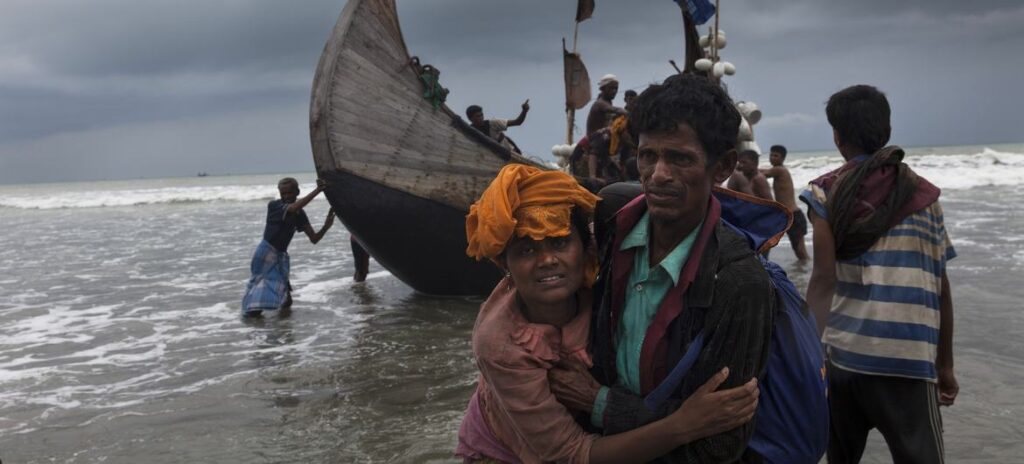In her report to the Human Rights Council in Geneva, Special Rapporteur Siobhan Mullally said the 2018 Global Compact for Safe, Orderly and Regular Migration obliges countries to “save lives and prevent migrant deaths and injuries through individual or joint search and rescue operations” at sea.
But that still means at least 8,565 people are expected to die on shipping routes around the world in 2023, “making it the deadliest year on record,” Mulally said. Just over half of the deaths will be from drowning, she added.
“For victims of trafficking at sea, the right to life must be guaranteed first and foremost as a fundamental and inalienable human right. States have an obligation to ensure that maritime actors are able to fulfil their obligations towards people in distress at sea,” she said.
Search and rescue
“It is therefore essential that maritime actors are fully supported to fulfil their search and rescue obligations under international law. These obligations must be carried out without discrimination, regardless of the status of those being rescued.”
Murally highlighted the dire situation in which many Rohingya refugees, including many refugee children, are at risk of human trafficking at sea.
She said nearly 4,500 Rohingya had embarked on the dangerous sea journey in 2023, with 569 reported to have died or gone missing. Compared to the previous year, the number of people who left shore increased by 21 percent, while the number of those killed or missing increased by 63 percent.
One-third of adults are at risk of illness due to lack of physical activity
A new study conducted by researchers from the World Health Organization (WHO) reveals that nearly one-third of adults worldwide – about 1.8 billion people – were not meeting recommended levels of physical activity in 2022.
If trends continue, inactivity levels are predicted to rise to 35% by 2030.
“Physical inactivity is a silent threat to global health and a major contributor to the burden of chronic diseases,” said Dr Rüdiger Krech, WHO's Director of Health Promotion.
According to the WHO's recommendations, adults should do 150 minutes of moderate-intensity or 75 minutes of vigorous-intensity physical activity each week. Lack of physical activity increases the risk of cardiovascular diseases such as heart attack and stroke, type 2 diabetes, dementia, and cancers such as breast and colon cancer.
The highest prevalence of physical inactivity was in high-income Asia-Pacific (48%) and South Asia (45%), with rates in other regions ranging from 14% in Oceania to 28% in high-income Western countries.
Gender Gap
Globally, physical inactivity remains higher in women than men: 34% are inactive compared to 29% in men – in some countries the difference is as high as 20%.
Additionally, people aged 60 and over are less active than other adults, highlighting the importance of promoting physical activity in this age group.
Despite the alarming results, almost half of the world's countries have made some improvement over the past decade, and 22 countries were identified as likely to meet the global target of reducing inactivity by 15% by 2030.
Scale of arbitrary executions in Iraq may amount to crimes against humanity
A group of human rights experts said Thursday that the “systematic” execution of prisoners sentenced to death based on confessions extracted through torture under an “ambiguous” anti-terrorism law amounts to arbitrary deprivation of life and may amount to crimes against humanity.
“We are alarmed by the very high number of executions announced since 2016 – nearly 400 in total, including 30 this year – and by the clear political determination to continue using the death penalty,” the experts appointed by the UN Human Rights Council said.
The Special Rapporteur added that this policy continues “in complete disregard” for reports of irregularities in the administration of justice, enforced disappearances and confessions obtained under torture, which drive sentencing policies.
There are around 8,000 prisoners on death row in Iraq, and experts said arbitrary executions, if widespread and systematic, could amount to crimes against humanity.
They said Iraq and other countries that retain the death penalty for common crimes should reserve it only for the “most serious crimes,” meaning intentional murder.
'Very worrying'
“We argue that most of the crimes detailed in articles 2 and 3 of the 2005 Anti-Terrorism Law No. 13 do not meet the criteria for the 'most serious crimes' and that these executions are arbitrary in nature,” the experts said.
“The alleged politicization of death sentences against primarily Iraqi Sunni men is deeply disturbing.”
They reiterated their call on the Iraqi government to immediately moratorium all executions, ensure fair retrials of those on death row, particularly those accused of terrorism crimes, and promptly launch thorough and impartial investigations.
Special Rapporteurs and other human rights experts appointed by the UN Human Rights Council are independent of any government, do not receive remuneration for their services and act in their personal capacity.



